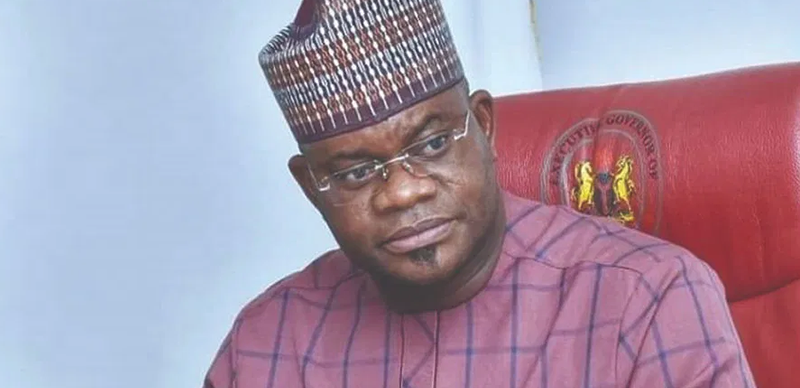
In a move to prevent the immediate past Governor of Kogi State, Yahaya Bello, from leaving the country, the Federal Government placed him on a watchlist.
A circular dated April 18, 2024, issued by the Nigerian Immigration Service and signed by Assistant Comptroller of Immigration DS Umar on behalf of Comptroller-General Kemi Nandap, instructed the police and the Department of State Services to apprehend the former governor.
Following unsuccessful attempts to arrest him on Wednesday in Abuja, the Economic and Financial Crimes Commission declared Bello wanted in connection to an alleged case of money laundering amounting to N80.2 billion.
Disagreements arose on Thursday between the Attorney General of the Federation and Minister of Justice, Lateef Fagbemi (SAN), and Abdulwahab Mohammed (SAN) regarding the aborted arrest by the EFCC.
The circular from the NIS, with copies sent to the DSS and the police, included the name, nationality, and passport number (B50083321) of the former Governor.
Signed by Assistant Comptroller of Immigration DS Umar for Comptroller-General Kemi Nandap, the circular indicated, “I am directed to inform you that the above-named person has been placed on the watch list.”
“The subject is currently facing prosecution before the Federal High Court in Abuja for Conspiracy, Breach of Trust, and Money Laundering,” the circular added.
The EFCC, in a Facebook post, declared Bello wanted for alleged money laundering activities totaling N80,246,470,089.88.
Anyone with information on the whereabouts of the former governor was urged to contact any EFCC office nationwide.
Bello’s absence from the Federal High Court in Abuja for his scheduled arraignment heightened the situation, leading to confrontations with EFCC operatives at his residence.
In response to Bello’s resistance towards surrendering, the Attorney General condemned the obstruction of EFCC officials, emphasizing the need for cooperation during investigations.
The AGF warned against evading the law, emphasizing the importance of upholding the rule of law and allowing state institutions to function effectively.
Defending Bello’s actions, Mohammed cited a court order obtained in Kogi State preventing the EFCC from inviting or prosecuting him, a matter currently under appeal.
The ex-governor’s lawyer, Mohammed, informed the court of a pending objection challenging the legal validity of the planned arraignment and trial.
The proceedings on Thursday were disrupted as Bello failed to appear in court.
Addressing the situation, Bello’s lawyer…
Bello’s lawyer expressed concerns about possible clashes between different courts as they sought an ex parte warrant of arrest for a defendant already before the court. The lawyer emphasized the court’s limited jurisdiction in the matter and criticized the events at Zone 4 Abuja, calling them unfortunate and highlighting the need for legal representation for the defendant.
The prosecuting counsel, Pinheiro, threatened to involve the military in arresting Bello and insisted on upholding the rule of law despite any immunity claims. The lawyer stressed the importance of abiding by the Constitution and compared the situation to legal proceedings in the United States.
The court adjourned the case to April 23, 2024, while civil society organizations cautioned against undermining court processes in the fight against corruption. They highlighted the EFCC’s actions as unnecessary and potentially politically motivated and urged respect for the rights of all individuals, regardless of the allegations against them.
The activists referenced court documents showing ongoing legal processes and criticized the EFCC for pursuing an arrest before the resolution of pending appeals. They stressed the importance of following legal procedures and respecting court orders.
Concerns were raised about the EFCC’s threat to involve the military in arrests, with warnings of global repercussions and calls for adherence to the rule of law. The CSOs emphasized the need for law enforcement agencies to operate within legal frameworks and uphold justice for all, irrespective of their status.
The activists called for a return to legal conformity in handling corruption cases and emphasized the need for universal compliance with legal regulations and processes. They reminded the EFCC of its commitment to the rule of law and urged a fair and lawful approach to the situation at hand.
